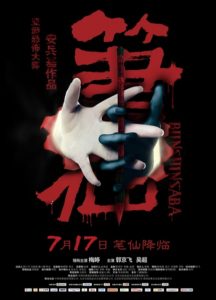Bunshinsaba
笔仙
China, 2012, colour, 2.35:1, 92 mins.
Director: An Byeong-gi 안병기 | 安兵基.
Rating: 5/10.
Slickly mounted horror, by the same director as the 2004 South Korean film, offers few scares.
Beijing, the present day. After five years of working on it, writer Xiao’ai (Mei Ting) has her horror novel rejected by her patient publisher (Ma Shuliang). She also hears that her ex-husband, Qi Kun (Wu Chao), who was imprisoned for domestic violence, has been released and is looking for her and their asthmatic young son Xiaoxin (Zhu Jiangdi). A doctor friend, Yi’nan (Guo Jingfei), offers them an old, remote house he owns in the countryside so she can work peacefully. In a large cupboard there, Xiao’ai finds some faded photos of a young woman and her child whose faces have been cut out. Yi’nan says they must have belonged to the previous owners, 20 or more years ago. In the garden, Xiaoxin finds an old female doll that he becomes specially attached to. Blocked for writing ideas, Xiao’ai uses the photos for inspiration, and starts on the story of a young girl whose parents are always arguing and whose father leaves home, to the girl’s distress. Suddenly, she finds her computer is writing and printing out the story for her. Xiaoxin also says the doll he found is talking to him, and is the girl who used to live in the house. Xiao’ai then starts seeing a ghostly girl (Gao Xinyu). She tells Yi’nan she can’t stay in the house any longer, and he agrees to take them away next morning. That night, however, the ghostly girl tells Xiao’ai she mustn’t leave – and then Xiaoxin goes missing.
REVIEW
After a directorial absence of six years, South Korean horror specialist An Byeong-gi 안병기 | 安兵基 recycles the English and Chinese titles of his 2004 movie, but not its content, for the Mainland-financed/shot Bunshinsaba 笔仙, a very déjà-vu exercise in ghostly scares, Korean style. An’s move to China comes at a time when South Korean horror films have lost their mojo; but he brings nothing special to the table here, apart from a slick professionalism. In fact, apart from the actors speaking Mandarin, the movie looks exactly like a South Korean one – from its clean-looking shooting style, photography (by Choi Sang-muk 최상묵 | 崔相默), editing (Ham Seong-weon 함성원 | 咸盛元), music (Jeong Yong-jin 정용진 | 丁庸鎭) and even immaculate wardrobe – and with its remote setting could just as well have been shot in South Korea as well.
After a lively start with slasher movie Nightmare 가위 (2000), An quickly peaked with the coolly stylish Phone 폰 (2002), before crashing with Bunshinsaba: Ouija Board 분신사바 and partly recovering with the back-to-basics psychothriller APT 아파트 (2006). The plot of the 2012 Bunshinsaba uses some of the techie slant of Phone (here with a computer and printer seemingly possessed of their own minds); but most of the story is a psychodrama jazzed up with ghostly elements, as a blocked horror writer starts going to pieces in a remote old house when she and her young son are “haunted” by ghosts of the past.
This being a Mainland production, there has to be a logical explanation for events – which is actually not a bad thing in terms of creative discipline, as many South Korean ghost movies simpy don’t make sense. However, the ending of the script, by three Chinese writers, can be seen a mile off, and is largely a collection of nightmares and visions prior to a more sustained third act. What the film lacks is a thoroughgoing sense of threat, in what is basically a chamber movie. An, who’s on record as saying he finds Mainland horror movies not very effective, produces a good-looking package but very few real scares. (Another Mainland movie, with a similar Chinese title and released only a month before – The Death Is Here 笔仙惊魂, 2012, aka BiXian Panic – manages just as many mild scares on a much smaller budget.)
The film hangs almost entirely on actress Mei Ting 梅婷, best known for A Time to Remember 红色恋人 (1999) with Zhang Guorong 张国荣 [Leslie Cheung], and Aspirin 阿司匹林 (2006) which she also produced, but on an acting level as the businessman’s wife in the artier Judge 透析 (2009). Mei, 37, is a distinctive-looking actress who has unfortunately been seen more in TV drama than in movies, but in Bunshinsaba she’s given little to work with, apart from looking confused and rather crazed in a big-eyed way. The only other adult actor to get a real look-in, is Guo Jingfei 郭京飞 (the duplicitous boyfriend in Love Is Not Blind 失恋33天, 2011), who’s solid in a best-friend role.
Since making the movie, An has become the first South Korean director to set up his own workshop (ByungKi An China Studio 安兵基導演工作室) on the Mainland, announced in late Apr 2012. “Bunshinsaba” is an invented word, like the English “abracadabra”.
CREDITS
Presented by China Film (CN), Beijing Yong Xu Liang Chen Culture Development Communication (CN), Beijing AHXA Investment (CN), Shenzhen Bing Culture Communication (CN). Produced by China Film (CN), Beijing Yong Xu Liang Chen Culture Development Communication (CN), Beijing AHXA Investment (CN), Shenzhen Bing Culture Communication (CN).
Script: Liu Han, Li Han, Li Wei. Photography: Choi Sang-muk. Editing: Ham Seong-weon. Music: Jeong Yong-jin. Art direction: Zhang Yu. Costumes: Zhang Yongyi. Sound: Wang Yanwei, Wu Ling, Wang Dong. Action: Gao Xiang. Visual effects: Han Dong-ho (Moneff). Executive director: Bak Cheol.
Cast: Mei Ting (Xiao’ai), Guo Jingfei (Yi’nan, her friend), Wu Chao (Qi Kun, her ex-husband), Zhu Jiangdi (Xiaoxin, her son), Liu Xiyuan (mother), Gao Xinyu (young girl), Ma Shuliang (publisher).
Release: China, 16 Jul 2012.
(Review originally published on Film Business Asia, 8 Aug 2012.)
